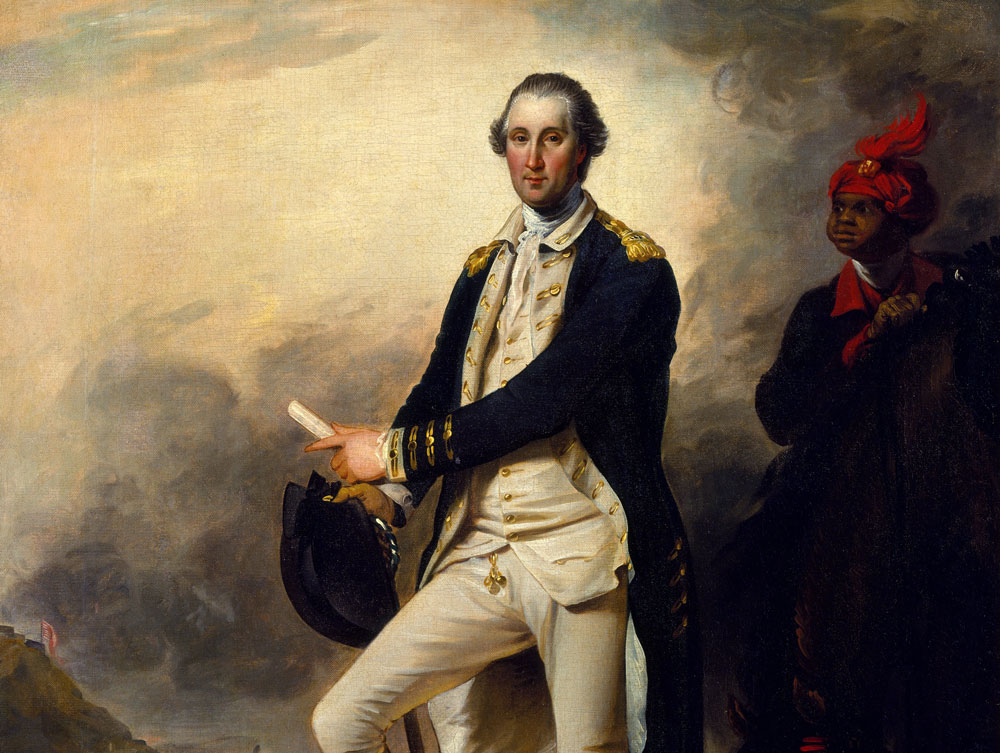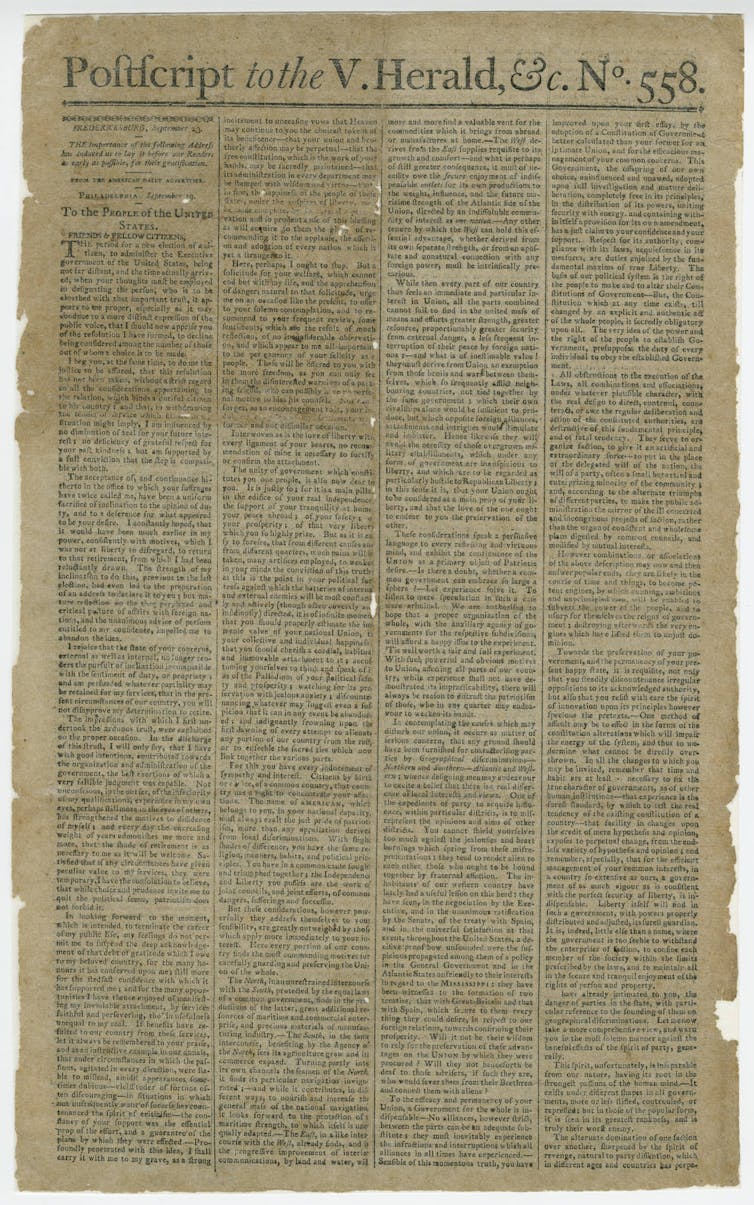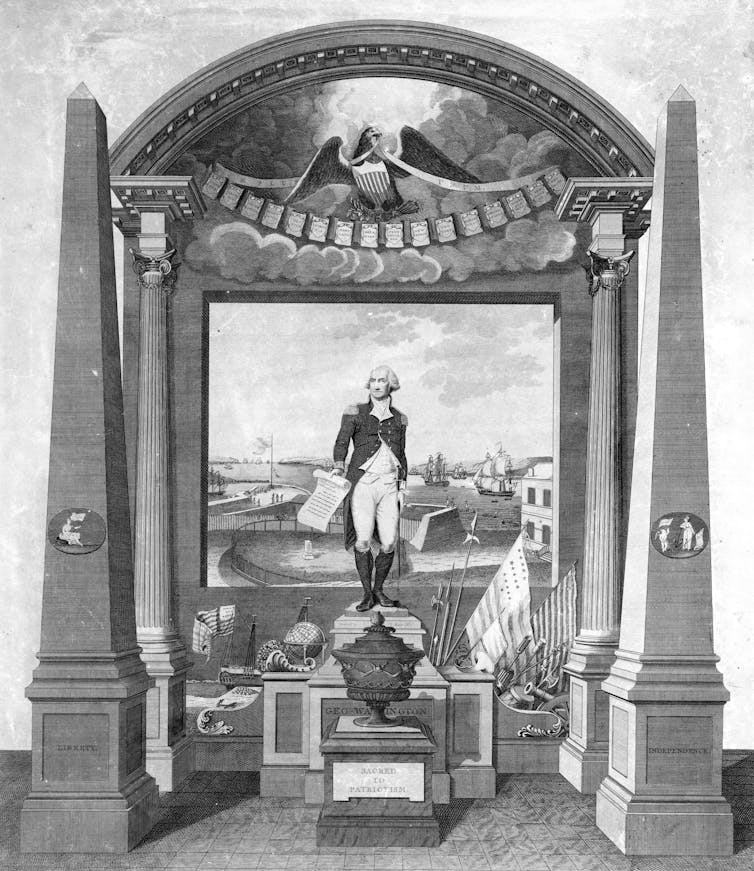
By Robert A. Strong
The United States will celebrate the 250th anniversary of the Declaration of Independence, the country’s founding document, in 2026. Twenty years later, America will celebrate the 250th anniversary of President George Washington’s Farewell Address, which was published on Sept. 19, 1796.
The two documents are the bookends of the American Revolution. That revolution began with the inspirational language of Thomas Jefferson, who wrote much of the Declaration of Independence; it ended with somber warnings from Washington, the nation’s first president.
After chairing the Constitutional Convention in Philadelphia and serving eight years as president, Washington announced in a newspaper essay that he would not seek another term and would return to his home in Mount Vernon. The essay was later known as the “Farewell Address.”
Washington began his essay by observing that “choice and prudence invite me to quit the political scene” while “patriotism does not forbid it.” The new nation would be fine without his continued service.
But Washington’s confidence in the general health of the union was tempered by his worries about dangers that lay ahead – worries that seem startlingly contemporary and relevant 229 years later.

Courtesy of The Mount Vernon Ladies’ Association, CC BY
Focus on the domestic
Washington’s Farewell Address is famous for the admonitions “to steer clear of permanent alliances” and to resist the temptation to “entangle our peace and prosperity in the toils of European ambition.”
Important as those warnings are, they are not the main topic of Washington’s message.
During the four decades that I have taught the Farewell Address in classes on American government, I have urged my students to set aside the familiar issues of foreign policy and isolationism and to read the address for what it says about the domestic challenges confronting America.
Those challenges included partisanship, parochialism, excessive public debt, ambitious leaders who could come to power playing off our differences, and a poorly informed public who might sacrifice their own liberties to find relief from divisive politics.
Washington’s address lacks Jefferson’s idealism about equality and inalienable rights. Instead, it offers the realistic assessment that Americans are sometimes foolish and make costly political mistakes.
Rule by ‘ambitious, and unprincipled men’
Partisanship is the primary problem for the American republic, according to Washington.
“It serves always to distract the public councils and enfeeble the public administration,” he wrote. Partisanship “agitates the community with ill founded jealousies and false alarms, kindles the animosity of one part against another, foments occasionally riot and insurrection” and can open “the door to foreign influence and corruption.”
Though political parties, Washington observes, “may now and then answer popular ends,” they can also become “potent engines by which cunning, ambitious, and unprincipled men will be enabled to subvert the power of the people and to usurp for themselves the reins of government, destroying afterwards the very engines which have lifted them to unjust dominion.”
Washington’s fear that partisanship could lead to destruction of the Constitution and to the rule of “ambitious, and unprincipled men” was so important to him that he felt compelled to repeat the warning more than once in the Farewell Address.

From the New York Public Library, photo by Smith Collection/Gado/Getty Images
Politicians’ ‘elevation on the ruins of public liberty’
The second time Washington takes it up, he says that “the disorders and miseries” of partisanship may “gradually incline the minds of men to seek security and repose in the absolute power of an individual.”
Sooner or later, he writes, “the chief of some prevailing faction, more able or more fortunate than his competitors, turns this disposition to the purposes of his own elevation on the ruins of public liberty.”
So why not outlaw parties and rein in the dangers of partisanship?
Washington observes that this is not possible. The spirit of party “is inseparable from our nature, having its root in the strongest passions of the human mind.”
Americans naturally collect themselves into groups, factions, interests and parties because that’s what human beings do. It’s easier to be connected to local communities, states or regions of the country than to a large and diverse nation; even though that large and diverse nation is, by Washington’s assessment, essential to the security and success of all.
The central problem in American politics is not a matter of devious leaders, foreign intrigue or sectional rivalries — things that will always exist.
The problem, Washington warned, lies with the people.
Excesses of partisanship
By their nature, people divide themselves into groups and then, if not careful, find those divisions used and abused by individual leaders, foreign interests and “artful and enterprising” minorities.
Political parties are dangerous, but can’t be eliminated. According to some people, Washington observes, the competition between parties might serve as a check on the powers of government.
“Within certain limits,” Washington acknowledges, “this is probably true.” But even if the battles between political parties sometimes have a useful purpose, Washington worried about the excesses of partisanship.
Partisanship is like “a fire not to be quenched, it demands a uniform vigilance to prevent its bursting into a flame, lest instead of warming it should consume.”
Where is America today? Warmed by the fires of partisanship or consumed by the bursting of flames? George Washington suggested that provocative question more than two centuries ago on Sept. 19, 1796. It’s still worth asking.
![]()
Robert A. Strong is Emeritus Professor of Politics at Washington and Lee University and Senior Fellow at the Miller Center at the University of Virginia.





























Ray W. says
For nearly the entirety of the time I have been posting comments to the FlaglerLive community, I have argued that, under our liberal democratic Constitutional republic, replete with checks and balances for every political power gifted by the people to the federal government by the Ratifying Conferences, no one person is to ever obtain unlimited political power for an indeterminate period of time.
Can it be argued that Washington is the model for my interpretation of this process of thinking?
Some 10 years ago, I drove Steve Gosney, a fellow assistant public defender, from the Daytona office to attend a retirement function for the head of the High Crimes Unit, scheduled in DeLand.
As we talked, he asked me what I thought was the most important political act in the history of our country. I immediately answered the decision by President Washington to not seek a third term in office. He told me that was his opinion, too.
I remain convinced that Washington’s decision to voluntarily surrender the reins of political power remains the most important political act in the history of this country.
Bo Peep says
Just stop the liberal nonsense and everything will work out
JimboXYZ says
“Rule by ‘ambitious, and unprincipled men’
Partisanship is the primary problem for the American republic, according to Washington.
“It serves always to distract the public councils and enfeeble the public administration,” he wrote. Partisanship “agitates the community with ill founded jealousies and false alarms, kindles the animosity of one part against another, foments occasionally riot and insurrection” and can open “the door to foreign influence and corruption.”
Though political parties, Washington observes, “may now and then answer popular ends,” they can also become “potent engines by which cunning, ambitious, and unprincipled men will be enabled to subvert the power of the people and to usurp for themselves the reins of government, destroying afterwards the very engines which have lifted them to unjust dominion.”
That pretty much sums up the Democrats from December 2019 to Jan 2025 to secure an administration of power for Biden-Harris ? When did all the rioting & looting start ? Fauci as the Covid expert was just disinformation. There are more examples, countless to list in this comment.
DaleL says
One obvious way to reduce partisanship, would be to remove the party designations from the names of candidates on the general ballot. As it is, many people vote for their “team”, rather than the person.